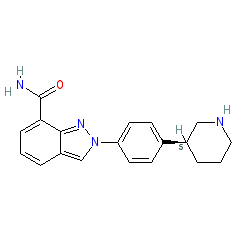GtoPdb is requesting financial support from commercial users. Please see our sustainability page for more information.
|
Synonyms: Akeega® (niraparib and abiraterone acetate) | compound 56 [PMID 19873981] | MK 4827 | MK-4827 | Zejula®
niraparib is an approved drug (EMA & FDA (2017))
Compound class:
Synthetic organic
Comment: Niraparib is a novel orally available poly(ADP-ribose) polymerase (PARP) inhibitor [4].
Ligand Activity Visualisation ChartsThese are box plot that provide a unique visualisation, summarising all the activity data for a ligand taken from ChEMBL and GtoPdb across multiple targets and species. Click on a plot to see the median, interquartile range, low and high data points. A value of zero indicates that no data are available. A separate chart is created for each target, and where possible the algorithm tries to merge ChEMBL and GtoPdb targets by matching them on name and UniProt accession, for each available species. However, please note that inconsistency in naming of targets may lead to data for the same target being reported across multiple charts. ✖ |
|
|||||||||||||||||||||||||||||||||||
| No information available. |
Summary of Clinical Use  |
| The FDA granted niraparib orphan drug designation for the treatment of ovarian cancer [6]. This was converted to full approval in March 2017, for the treatment of recurrent epithelial ovarian, fallopian tube, or primary peritoneal cancer in a complete or partial response to platinum-based chemotherapy. This drug is administered orally, once-daily. Phase 3 clinical trial in HER2 -ve/BRCA mutation +ve breast cancer (NCT01905592) is ongoing. In April 2020, the FDA expanded use of niraparib as a maintenance treatment for patients with the initial indicated cancer settings. In August 2023 the FDA approved Akeega®, first-in-class dual action tablet that contains niraparib plus the androgen synthesis inhibitor abiraterone acetate, for the treatment of metastatic castration-resistant prostate cancer (mCRPC) with a confirmed BRCA mutation. |
Mechanism Of Action and Pharmacodynamic Effects  |
| PARP inhibitors may funtion by trapping PARPs on DNA [5], generating cytotoxic PARP-DNA complexes. PARP inhibition is particularly toxic in cancer cell lines [1-2]and human tumours [3] that lack the DNA repair mechanism of BRCA1 or BRCA2 .. |
| Clinical Trials | |||||
| Clinical Trial ID | Title | Type | Source | Comment | References |
| NCT01905592 | A Phase III Trial of Niraparib Versus Physician's Choice in HER2 Negative, Germline BRCA Mutation-positive Breast Cancer Patients | Phase 3 Interventional | Tesaro, Inc. | ||
External links  |
|
For extended ADME data see the following: Electronic Medicines Compendium (eMC) Drugs.com European Medicines Agency (EMA) |







